LST2BSL Business Law & Ethics: La Trobe Case Study Analysis
VerifiedAdded on 2023/04/21
|9
|2053
|499
Case Study
AI Summary
This case study delves into several business law issues arising from a scenario involving Alicia, Rasheed, Ting, and Ron. It analyzes whether Alicia has a contractual obligation to sell her café to Rasheed, focusing on the concept of misrepresentation and whether Rasheed fraudulently misrepresented his intentions. The study also considers the applicability of promissory estoppel in this situation. Furthermore, it assesses Ting's eligibility to recover the full agreed amount for signboard work from Alicia, even after Alicia hired someone else to complete the job. Lastly, the case examines whether Ron is entitled to claim free coffee vouchers from Alicia, based on an offer he was unaware of when he gave her coffee mugs. The analysis involves applying relevant legal rules and principles to the facts to reach reasoned conclusions on each issue.
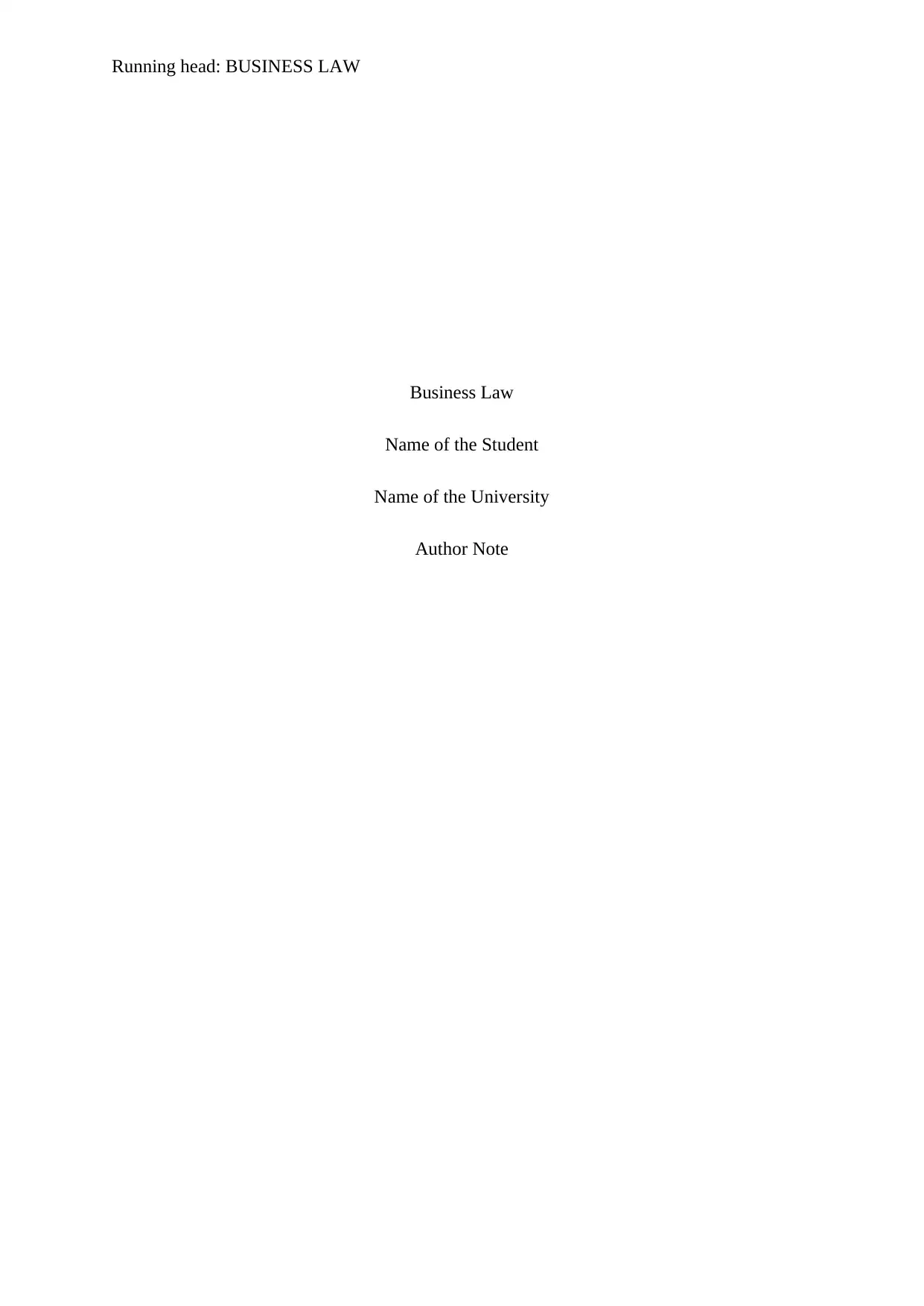
Running head: BUSINESS LAW
Business Law
Name of the Student
Name of the University
Author Note
Business Law
Name of the Student
Name of the University
Author Note
Paraphrase This Document
Need a fresh take? Get an instant paraphrase of this document with our AI Paraphraser
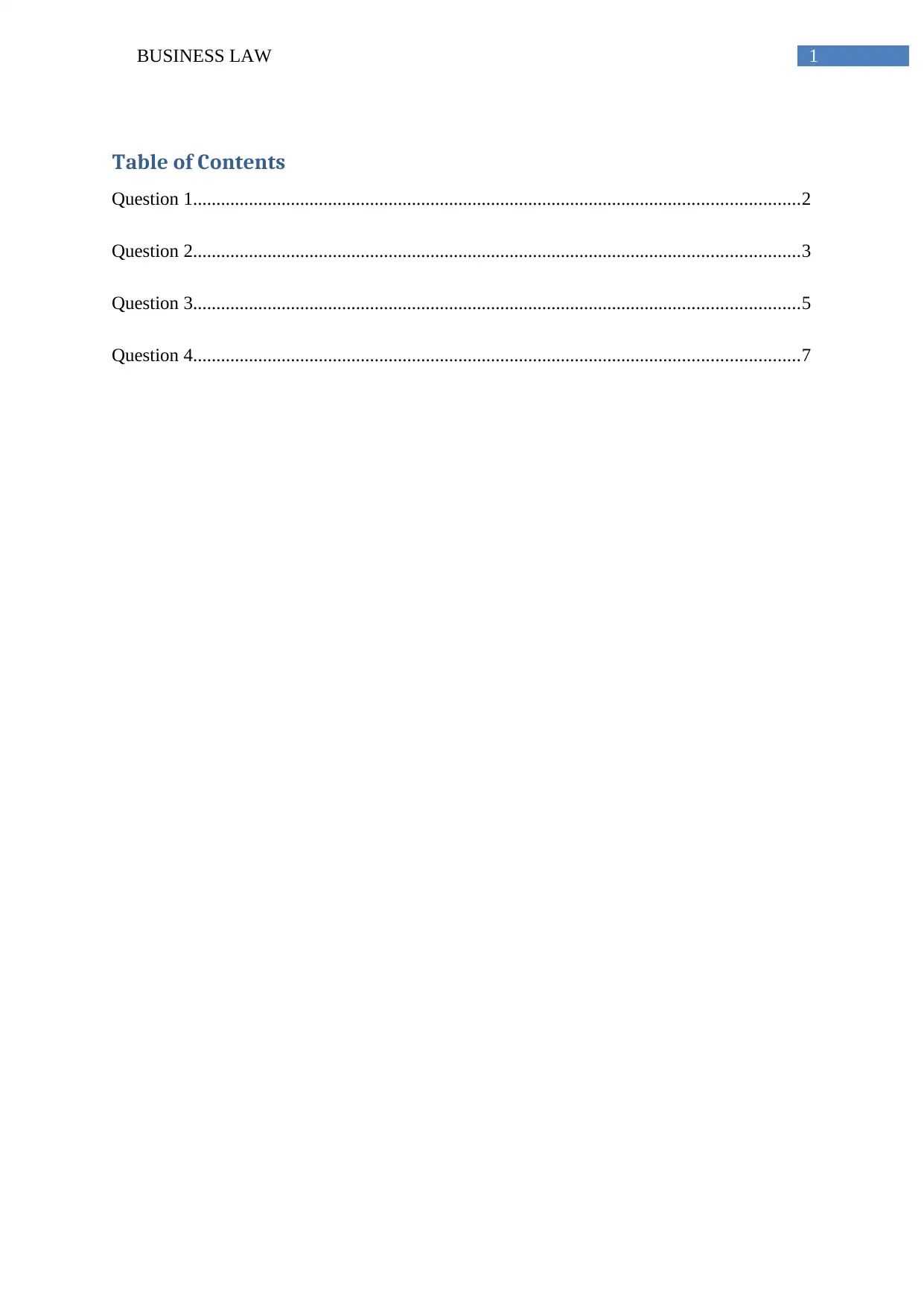
1BUSINESS LAW
Table of Contents
Question 1..................................................................................................................................2
Question 2..................................................................................................................................3
Question 3..................................................................................................................................5
Question 4..................................................................................................................................7
Table of Contents
Question 1..................................................................................................................................2
Question 2..................................................................................................................................3
Question 3..................................................................................................................................5
Question 4..................................................................................................................................7
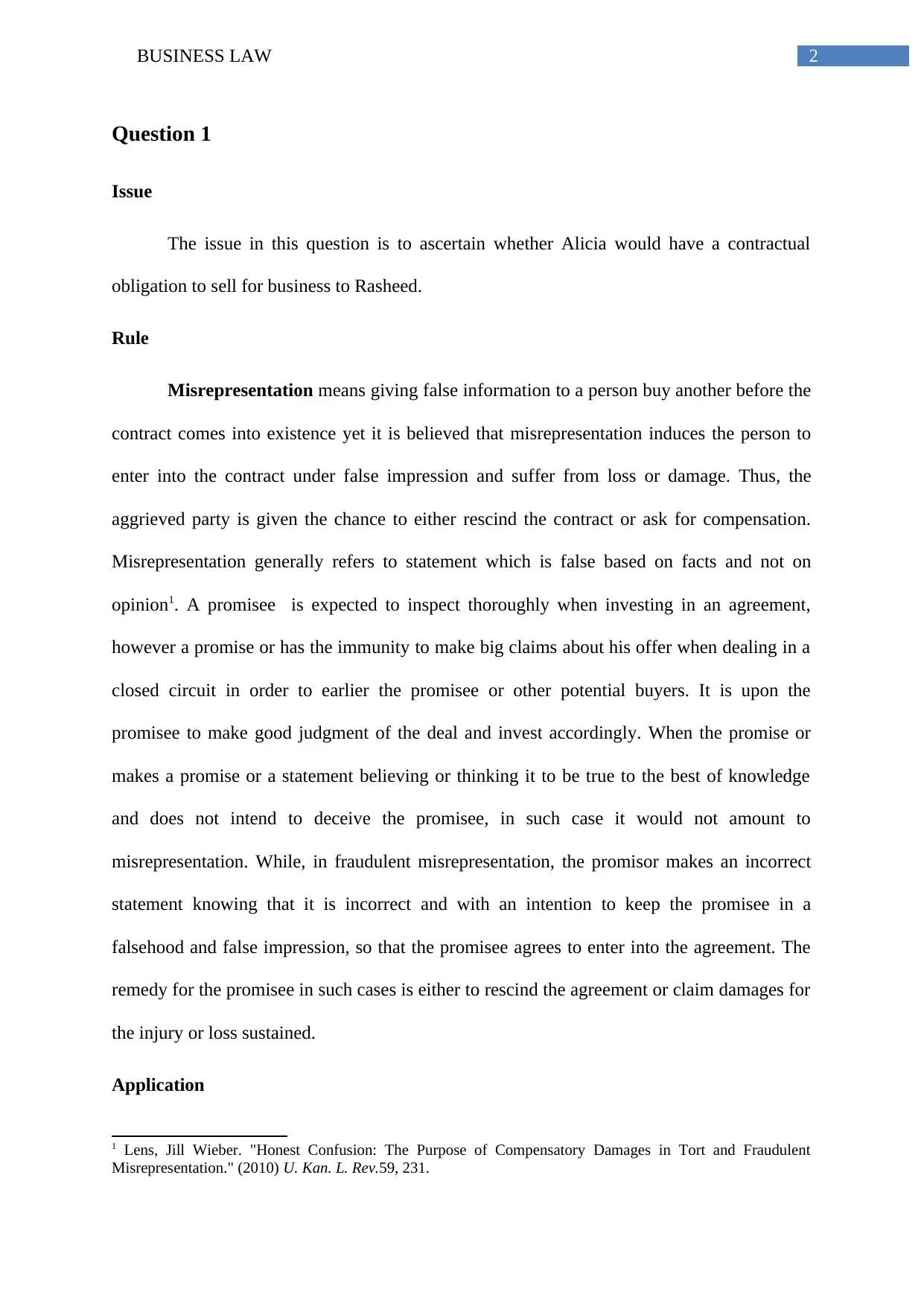
2BUSINESS LAW
Question 1
Issue
The issue in this question is to ascertain whether Alicia would have a contractual
obligation to sell for business to Rasheed.
Rule
Misrepresentation means giving false information to a person buy another before the
contract comes into existence yet it is believed that misrepresentation induces the person to
enter into the contract under false impression and suffer from loss or damage. Thus, the
aggrieved party is given the chance to either rescind the contract or ask for compensation.
Misrepresentation generally refers to statement which is false based on facts and not on
opinion1. A promisee is expected to inspect thoroughly when investing in an agreement,
however a promise or has the immunity to make big claims about his offer when dealing in a
closed circuit in order to earlier the promisee or other potential buyers. It is upon the
promisee to make good judgment of the deal and invest accordingly. When the promise or
makes a promise or a statement believing or thinking it to be true to the best of knowledge
and does not intend to deceive the promisee, in such case it would not amount to
misrepresentation. While, in fraudulent misrepresentation, the promisor makes an incorrect
statement knowing that it is incorrect and with an intention to keep the promisee in a
falsehood and false impression, so that the promisee agrees to enter into the agreement. The
remedy for the promisee in such cases is either to rescind the agreement or claim damages for
the injury or loss sustained.
Application
1 Lens, Jill Wieber. "Honest Confusion: The Purpose of Compensatory Damages in Tort and Fraudulent
Misrepresentation." (2010) U. Kan. L. Rev.59, 231.
Question 1
Issue
The issue in this question is to ascertain whether Alicia would have a contractual
obligation to sell for business to Rasheed.
Rule
Misrepresentation means giving false information to a person buy another before the
contract comes into existence yet it is believed that misrepresentation induces the person to
enter into the contract under false impression and suffer from loss or damage. Thus, the
aggrieved party is given the chance to either rescind the contract or ask for compensation.
Misrepresentation generally refers to statement which is false based on facts and not on
opinion1. A promisee is expected to inspect thoroughly when investing in an agreement,
however a promise or has the immunity to make big claims about his offer when dealing in a
closed circuit in order to earlier the promisee or other potential buyers. It is upon the
promisee to make good judgment of the deal and invest accordingly. When the promise or
makes a promise or a statement believing or thinking it to be true to the best of knowledge
and does not intend to deceive the promisee, in such case it would not amount to
misrepresentation. While, in fraudulent misrepresentation, the promisor makes an incorrect
statement knowing that it is incorrect and with an intention to keep the promisee in a
falsehood and false impression, so that the promisee agrees to enter into the agreement. The
remedy for the promisee in such cases is either to rescind the agreement or claim damages for
the injury or loss sustained.
Application
1 Lens, Jill Wieber. "Honest Confusion: The Purpose of Compensatory Damages in Tort and Fraudulent
Misrepresentation." (2010) U. Kan. L. Rev.59, 231.
⊘ This is a preview!⊘
Do you want full access?
Subscribe today to unlock all pages.

Trusted by 1+ million students worldwide
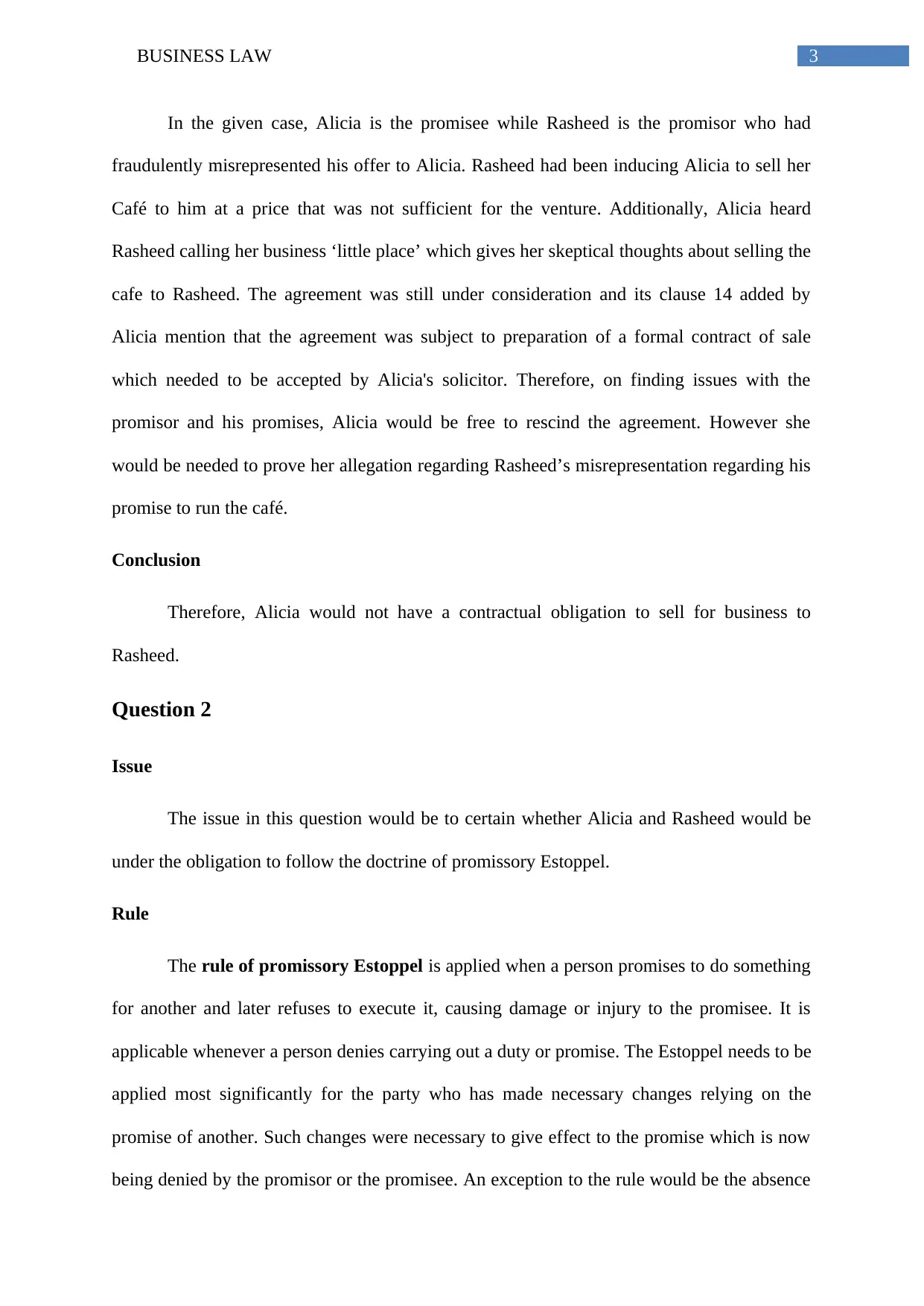
3BUSINESS LAW
In the given case, Alicia is the promisee while Rasheed is the promisor who had
fraudulently misrepresented his offer to Alicia. Rasheed had been inducing Alicia to sell her
Café to him at a price that was not sufficient for the venture. Additionally, Alicia heard
Rasheed calling her business ‘little place’ which gives her skeptical thoughts about selling the
cafe to Rasheed. The agreement was still under consideration and its clause 14 added by
Alicia mention that the agreement was subject to preparation of a formal contract of sale
which needed to be accepted by Alicia's solicitor. Therefore, on finding issues with the
promisor and his promises, Alicia would be free to rescind the agreement. However she
would be needed to prove her allegation regarding Rasheed’s misrepresentation regarding his
promise to run the café.
Conclusion
Therefore, Alicia would not have a contractual obligation to sell for business to
Rasheed.
Question 2
Issue
The issue in this question would be to certain whether Alicia and Rasheed would be
under the obligation to follow the doctrine of promissory Estoppel.
Rule
The rule of promissory Estoppel is applied when a person promises to do something
for another and later refuses to execute it, causing damage or injury to the promisee. It is
applicable whenever a person denies carrying out a duty or promise. The Estoppel needs to be
applied most significantly for the party who has made necessary changes relying on the
promise of another. Such changes were necessary to give effect to the promise which is now
being denied by the promisor or the promisee. An exception to the rule would be the absence
In the given case, Alicia is the promisee while Rasheed is the promisor who had
fraudulently misrepresented his offer to Alicia. Rasheed had been inducing Alicia to sell her
Café to him at a price that was not sufficient for the venture. Additionally, Alicia heard
Rasheed calling her business ‘little place’ which gives her skeptical thoughts about selling the
cafe to Rasheed. The agreement was still under consideration and its clause 14 added by
Alicia mention that the agreement was subject to preparation of a formal contract of sale
which needed to be accepted by Alicia's solicitor. Therefore, on finding issues with the
promisor and his promises, Alicia would be free to rescind the agreement. However she
would be needed to prove her allegation regarding Rasheed’s misrepresentation regarding his
promise to run the café.
Conclusion
Therefore, Alicia would not have a contractual obligation to sell for business to
Rasheed.
Question 2
Issue
The issue in this question would be to certain whether Alicia and Rasheed would be
under the obligation to follow the doctrine of promissory Estoppel.
Rule
The rule of promissory Estoppel is applied when a person promises to do something
for another and later refuses to execute it, causing damage or injury to the promisee. It is
applicable whenever a person denies carrying out a duty or promise. The Estoppel needs to be
applied most significantly for the party who has made necessary changes relying on the
promise of another. Such changes were necessary to give effect to the promise which is now
being denied by the promisor or the promisee. An exception to the rule would be the absence
Paraphrase This Document
Need a fresh take? Get an instant paraphrase of this document with our AI Paraphraser
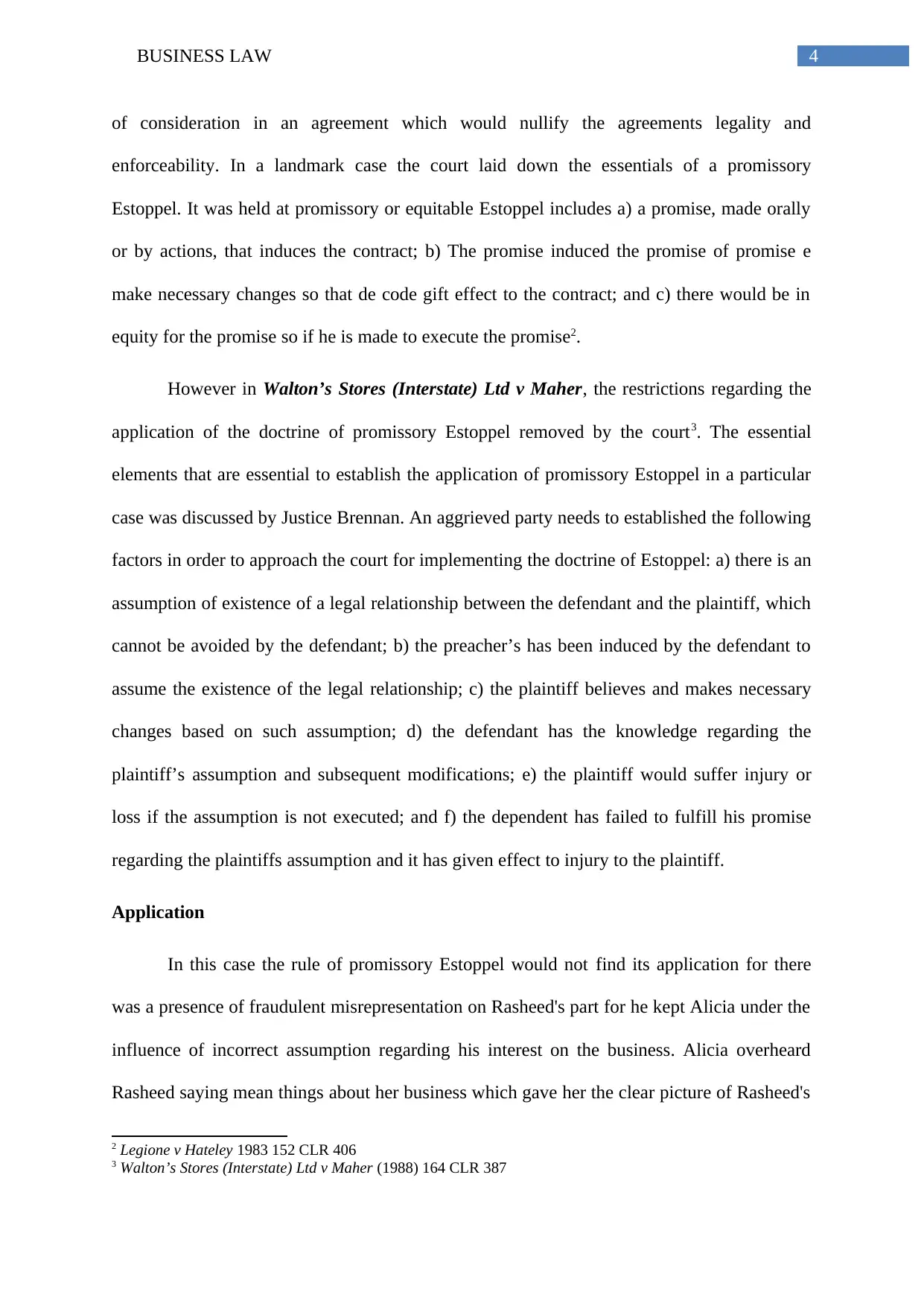
4BUSINESS LAW
of consideration in an agreement which would nullify the agreements legality and
enforceability. In a landmark case the court laid down the essentials of a promissory
Estoppel. It was held at promissory or equitable Estoppel includes a) a promise, made orally
or by actions, that induces the contract; b) The promise induced the promise of promise e
make necessary changes so that de code gift effect to the contract; and c) there would be in
equity for the promise so if he is made to execute the promise2.
However in Walton’s Stores (Interstate) Ltd v Maher, the restrictions regarding the
application of the doctrine of promissory Estoppel removed by the court3. The essential
elements that are essential to establish the application of promissory Estoppel in a particular
case was discussed by Justice Brennan. An aggrieved party needs to established the following
factors in order to approach the court for implementing the doctrine of Estoppel: a) there is an
assumption of existence of a legal relationship between the defendant and the plaintiff, which
cannot be avoided by the defendant; b) the preacher’s has been induced by the defendant to
assume the existence of the legal relationship; c) the plaintiff believes and makes necessary
changes based on such assumption; d) the defendant has the knowledge regarding the
plaintiff’s assumption and subsequent modifications; e) the plaintiff would suffer injury or
loss if the assumption is not executed; and f) the dependent has failed to fulfill his promise
regarding the plaintiffs assumption and it has given effect to injury to the plaintiff.
Application
In this case the rule of promissory Estoppel would not find its application for there
was a presence of fraudulent misrepresentation on Rasheed's part for he kept Alicia under the
influence of incorrect assumption regarding his interest on the business. Alicia overheard
Rasheed saying mean things about her business which gave her the clear picture of Rasheed's
2 Legione v Hateley 1983 152 CLR 406
3 Walton’s Stores (Interstate) Ltd v Maher (1988) 164 CLR 387
of consideration in an agreement which would nullify the agreements legality and
enforceability. In a landmark case the court laid down the essentials of a promissory
Estoppel. It was held at promissory or equitable Estoppel includes a) a promise, made orally
or by actions, that induces the contract; b) The promise induced the promise of promise e
make necessary changes so that de code gift effect to the contract; and c) there would be in
equity for the promise so if he is made to execute the promise2.
However in Walton’s Stores (Interstate) Ltd v Maher, the restrictions regarding the
application of the doctrine of promissory Estoppel removed by the court3. The essential
elements that are essential to establish the application of promissory Estoppel in a particular
case was discussed by Justice Brennan. An aggrieved party needs to established the following
factors in order to approach the court for implementing the doctrine of Estoppel: a) there is an
assumption of existence of a legal relationship between the defendant and the plaintiff, which
cannot be avoided by the defendant; b) the preacher’s has been induced by the defendant to
assume the existence of the legal relationship; c) the plaintiff believes and makes necessary
changes based on such assumption; d) the defendant has the knowledge regarding the
plaintiff’s assumption and subsequent modifications; e) the plaintiff would suffer injury or
loss if the assumption is not executed; and f) the dependent has failed to fulfill his promise
regarding the plaintiffs assumption and it has given effect to injury to the plaintiff.
Application
In this case the rule of promissory Estoppel would not find its application for there
was a presence of fraudulent misrepresentation on Rasheed's part for he kept Alicia under the
influence of incorrect assumption regarding his interest on the business. Alicia overheard
Rasheed saying mean things about her business which gave her the clear picture of Rasheed's
2 Legione v Hateley 1983 152 CLR 406
3 Walton’s Stores (Interstate) Ltd v Maher (1988) 164 CLR 387
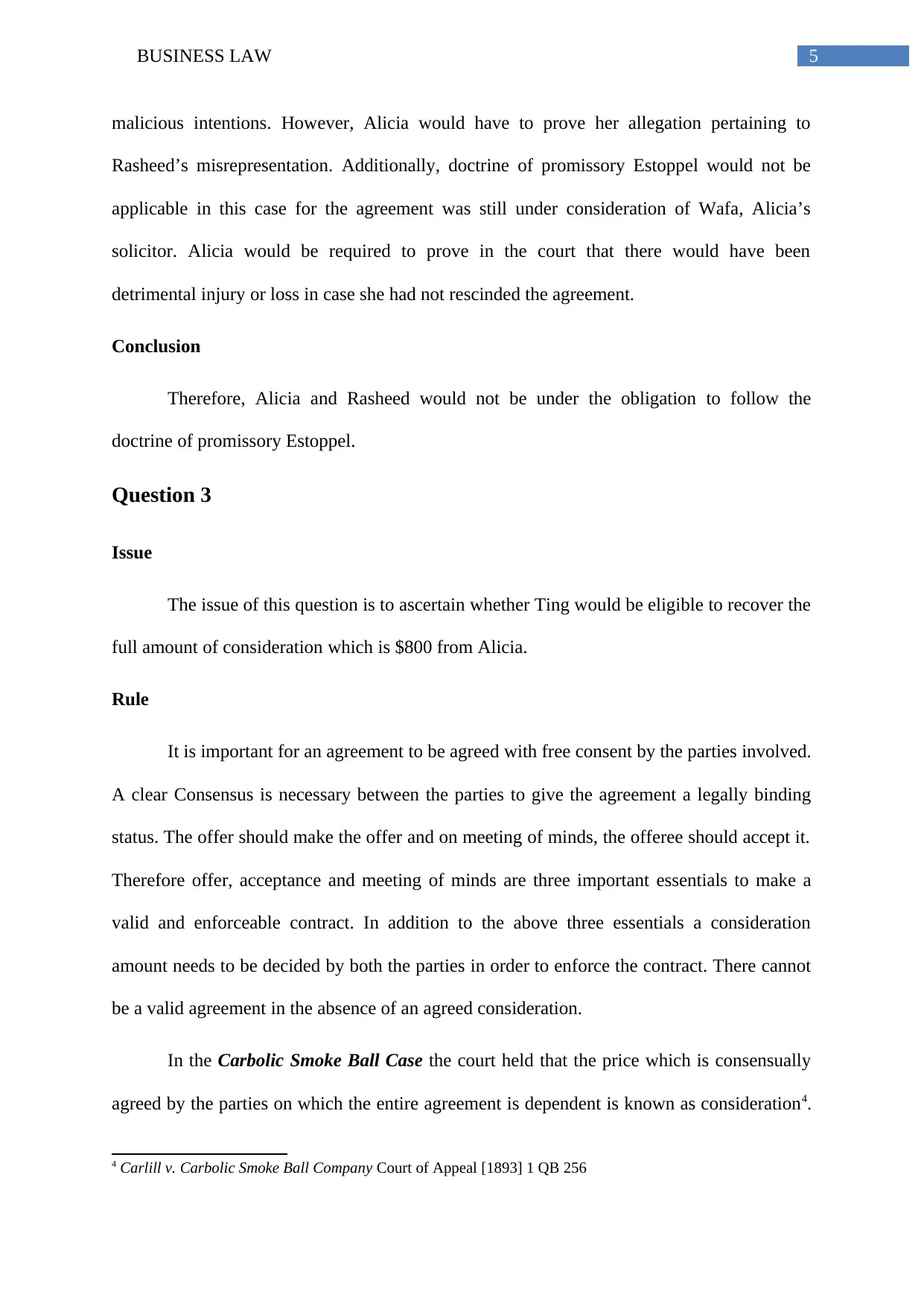
5BUSINESS LAW
malicious intentions. However, Alicia would have to prove her allegation pertaining to
Rasheed’s misrepresentation. Additionally, doctrine of promissory Estoppel would not be
applicable in this case for the agreement was still under consideration of Wafa, Alicia’s
solicitor. Alicia would be required to prove in the court that there would have been
detrimental injury or loss in case she had not rescinded the agreement.
Conclusion
Therefore, Alicia and Rasheed would not be under the obligation to follow the
doctrine of promissory Estoppel.
Question 3
Issue
The issue of this question is to ascertain whether Ting would be eligible to recover the
full amount of consideration which is $800 from Alicia.
Rule
It is important for an agreement to be agreed with free consent by the parties involved.
A clear Consensus is necessary between the parties to give the agreement a legally binding
status. The offer should make the offer and on meeting of minds, the offeree should accept it.
Therefore offer, acceptance and meeting of minds are three important essentials to make a
valid and enforceable contract. In addition to the above three essentials a consideration
amount needs to be decided by both the parties in order to enforce the contract. There cannot
be a valid agreement in the absence of an agreed consideration.
In the Carbolic Smoke Ball Case the court held that the price which is consensually
agreed by the parties on which the entire agreement is dependent is known as consideration4.
4 Carlill v. Carbolic Smoke Ball Company Court of Appeal [1893] 1 QB 256
malicious intentions. However, Alicia would have to prove her allegation pertaining to
Rasheed’s misrepresentation. Additionally, doctrine of promissory Estoppel would not be
applicable in this case for the agreement was still under consideration of Wafa, Alicia’s
solicitor. Alicia would be required to prove in the court that there would have been
detrimental injury or loss in case she had not rescinded the agreement.
Conclusion
Therefore, Alicia and Rasheed would not be under the obligation to follow the
doctrine of promissory Estoppel.
Question 3
Issue
The issue of this question is to ascertain whether Ting would be eligible to recover the
full amount of consideration which is $800 from Alicia.
Rule
It is important for an agreement to be agreed with free consent by the parties involved.
A clear Consensus is necessary between the parties to give the agreement a legally binding
status. The offer should make the offer and on meeting of minds, the offeree should accept it.
Therefore offer, acceptance and meeting of minds are three important essentials to make a
valid and enforceable contract. In addition to the above three essentials a consideration
amount needs to be decided by both the parties in order to enforce the contract. There cannot
be a valid agreement in the absence of an agreed consideration.
In the Carbolic Smoke Ball Case the court held that the price which is consensually
agreed by the parties on which the entire agreement is dependent is known as consideration4.
4 Carlill v. Carbolic Smoke Ball Company Court of Appeal [1893] 1 QB 256
⊘ This is a preview!⊘
Do you want full access?
Subscribe today to unlock all pages.

Trusted by 1+ million students worldwide
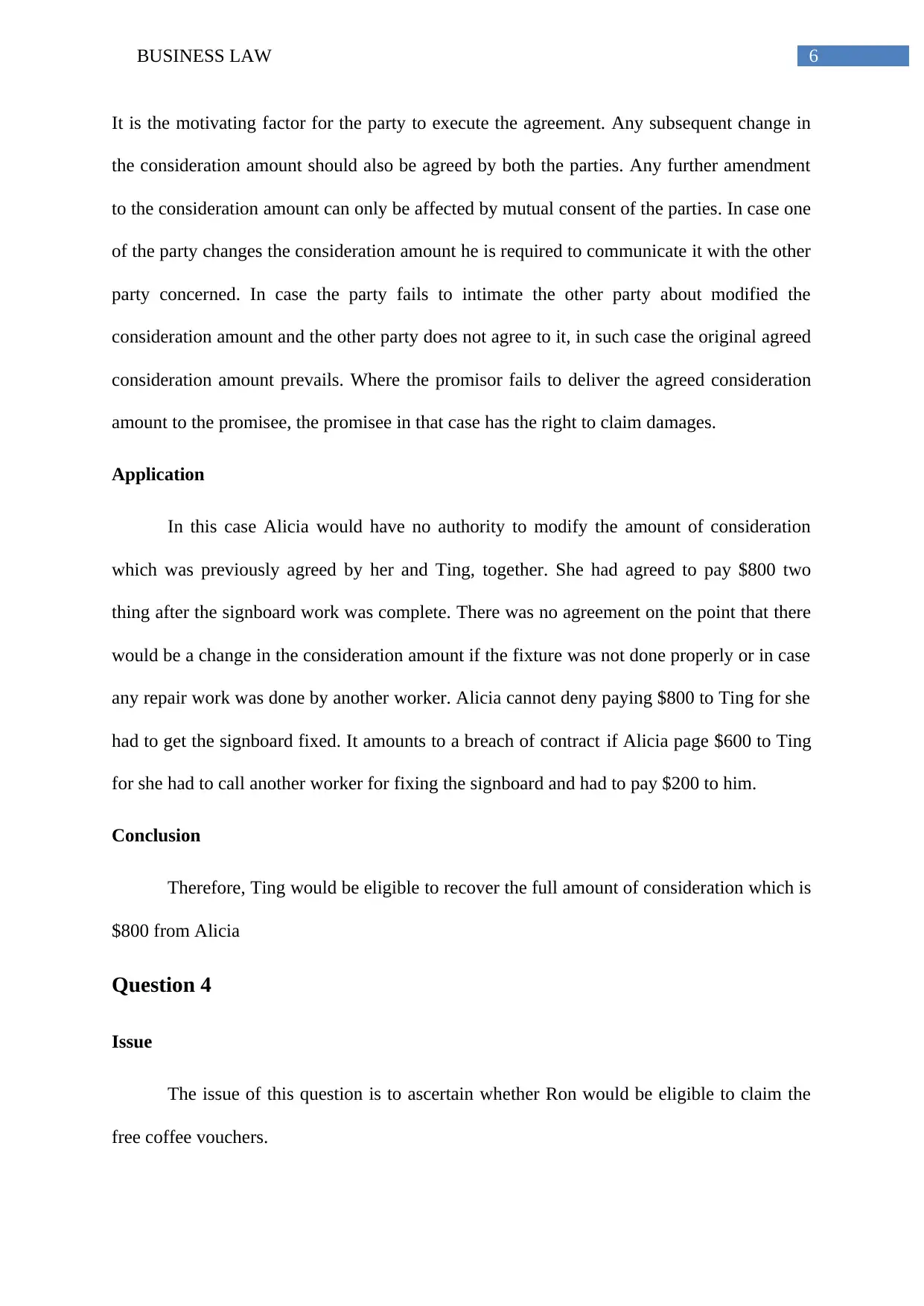
6BUSINESS LAW
It is the motivating factor for the party to execute the agreement. Any subsequent change in
the consideration amount should also be agreed by both the parties. Any further amendment
to the consideration amount can only be affected by mutual consent of the parties. In case one
of the party changes the consideration amount he is required to communicate it with the other
party concerned. In case the party fails to intimate the other party about modified the
consideration amount and the other party does not agree to it, in such case the original agreed
consideration amount prevails. Where the promisor fails to deliver the agreed consideration
amount to the promisee, the promisee in that case has the right to claim damages.
Application
In this case Alicia would have no authority to modify the amount of consideration
which was previously agreed by her and Ting, together. She had agreed to pay $800 two
thing after the signboard work was complete. There was no agreement on the point that there
would be a change in the consideration amount if the fixture was not done properly or in case
any repair work was done by another worker. Alicia cannot deny paying $800 to Ting for she
had to get the signboard fixed. It amounts to a breach of contract if Alicia page $600 to Ting
for she had to call another worker for fixing the signboard and had to pay $200 to him.
Conclusion
Therefore, Ting would be eligible to recover the full amount of consideration which is
$800 from Alicia
Question 4
Issue
The issue of this question is to ascertain whether Ron would be eligible to claim the
free coffee vouchers.
It is the motivating factor for the party to execute the agreement. Any subsequent change in
the consideration amount should also be agreed by both the parties. Any further amendment
to the consideration amount can only be affected by mutual consent of the parties. In case one
of the party changes the consideration amount he is required to communicate it with the other
party concerned. In case the party fails to intimate the other party about modified the
consideration amount and the other party does not agree to it, in such case the original agreed
consideration amount prevails. Where the promisor fails to deliver the agreed consideration
amount to the promisee, the promisee in that case has the right to claim damages.
Application
In this case Alicia would have no authority to modify the amount of consideration
which was previously agreed by her and Ting, together. She had agreed to pay $800 two
thing after the signboard work was complete. There was no agreement on the point that there
would be a change in the consideration amount if the fixture was not done properly or in case
any repair work was done by another worker. Alicia cannot deny paying $800 to Ting for she
had to get the signboard fixed. It amounts to a breach of contract if Alicia page $600 to Ting
for she had to call another worker for fixing the signboard and had to pay $200 to him.
Conclusion
Therefore, Ting would be eligible to recover the full amount of consideration which is
$800 from Alicia
Question 4
Issue
The issue of this question is to ascertain whether Ron would be eligible to claim the
free coffee vouchers.
Paraphrase This Document
Need a fresh take? Get an instant paraphrase of this document with our AI Paraphraser
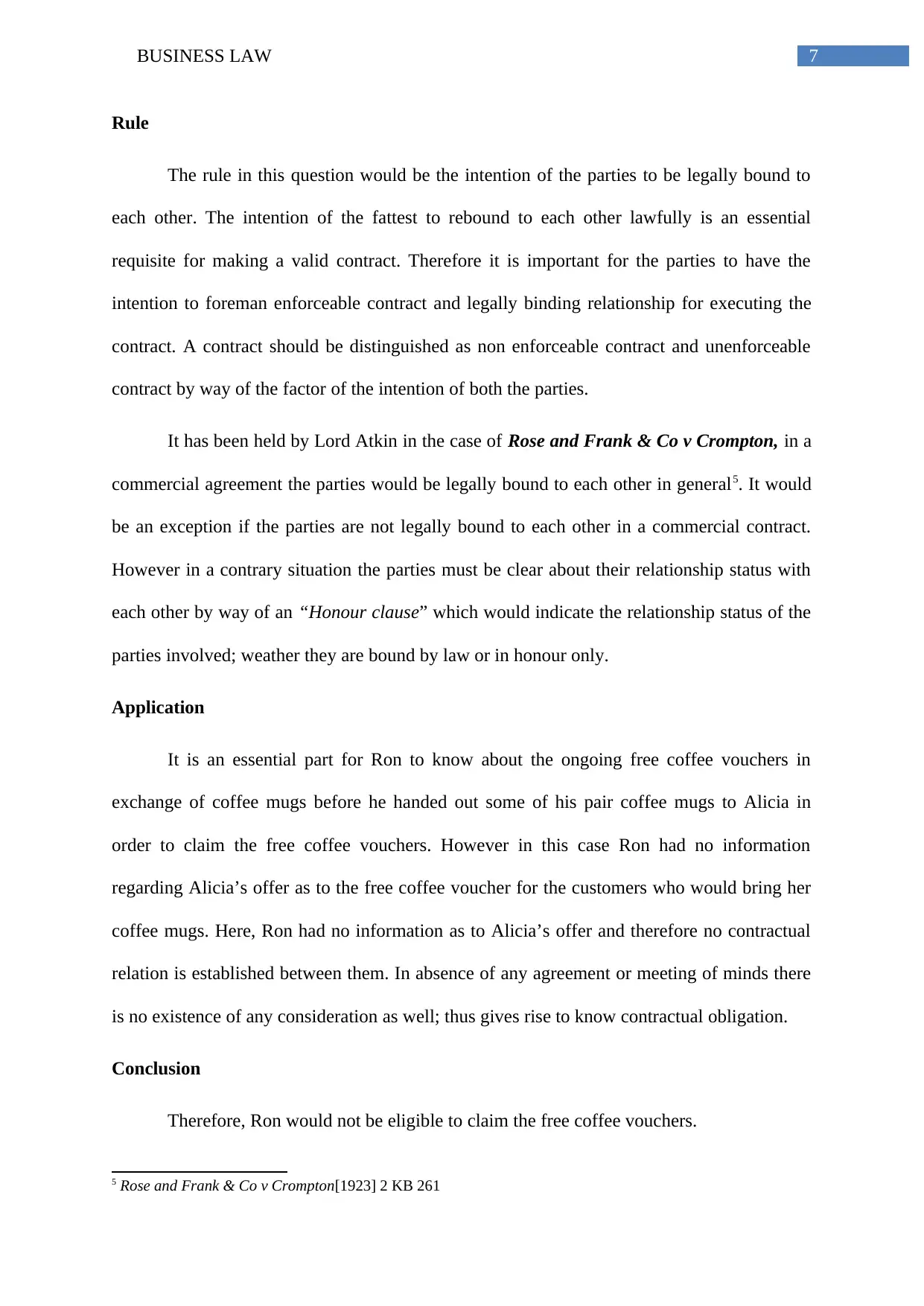
7BUSINESS LAW
Rule
The rule in this question would be the intention of the parties to be legally bound to
each other. The intention of the fattest to rebound to each other lawfully is an essential
requisite for making a valid contract. Therefore it is important for the parties to have the
intention to foreman enforceable contract and legally binding relationship for executing the
contract. A contract should be distinguished as non enforceable contract and unenforceable
contract by way of the factor of the intention of both the parties.
It has been held by Lord Atkin in the case of Rose and Frank & Co v Crompton, in a
commercial agreement the parties would be legally bound to each other in general5. It would
be an exception if the parties are not legally bound to each other in a commercial contract.
However in a contrary situation the parties must be clear about their relationship status with
each other by way of an “Honour clause” which would indicate the relationship status of the
parties involved; weather they are bound by law or in honour only.
Application
It is an essential part for Ron to know about the ongoing free coffee vouchers in
exchange of coffee mugs before he handed out some of his pair coffee mugs to Alicia in
order to claim the free coffee vouchers. However in this case Ron had no information
regarding Alicia’s offer as to the free coffee voucher for the customers who would bring her
coffee mugs. Here, Ron had no information as to Alicia’s offer and therefore no contractual
relation is established between them. In absence of any agreement or meeting of minds there
is no existence of any consideration as well; thus gives rise to know contractual obligation.
Conclusion
Therefore, Ron would not be eligible to claim the free coffee vouchers.
5 Rose and Frank & Co v Crompton[1923] 2 KB 261
Rule
The rule in this question would be the intention of the parties to be legally bound to
each other. The intention of the fattest to rebound to each other lawfully is an essential
requisite for making a valid contract. Therefore it is important for the parties to have the
intention to foreman enforceable contract and legally binding relationship for executing the
contract. A contract should be distinguished as non enforceable contract and unenforceable
contract by way of the factor of the intention of both the parties.
It has been held by Lord Atkin in the case of Rose and Frank & Co v Crompton, in a
commercial agreement the parties would be legally bound to each other in general5. It would
be an exception if the parties are not legally bound to each other in a commercial contract.
However in a contrary situation the parties must be clear about their relationship status with
each other by way of an “Honour clause” which would indicate the relationship status of the
parties involved; weather they are bound by law or in honour only.
Application
It is an essential part for Ron to know about the ongoing free coffee vouchers in
exchange of coffee mugs before he handed out some of his pair coffee mugs to Alicia in
order to claim the free coffee vouchers. However in this case Ron had no information
regarding Alicia’s offer as to the free coffee voucher for the customers who would bring her
coffee mugs. Here, Ron had no information as to Alicia’s offer and therefore no contractual
relation is established between them. In absence of any agreement or meeting of minds there
is no existence of any consideration as well; thus gives rise to know contractual obligation.
Conclusion
Therefore, Ron would not be eligible to claim the free coffee vouchers.
5 Rose and Frank & Co v Crompton[1923] 2 KB 261
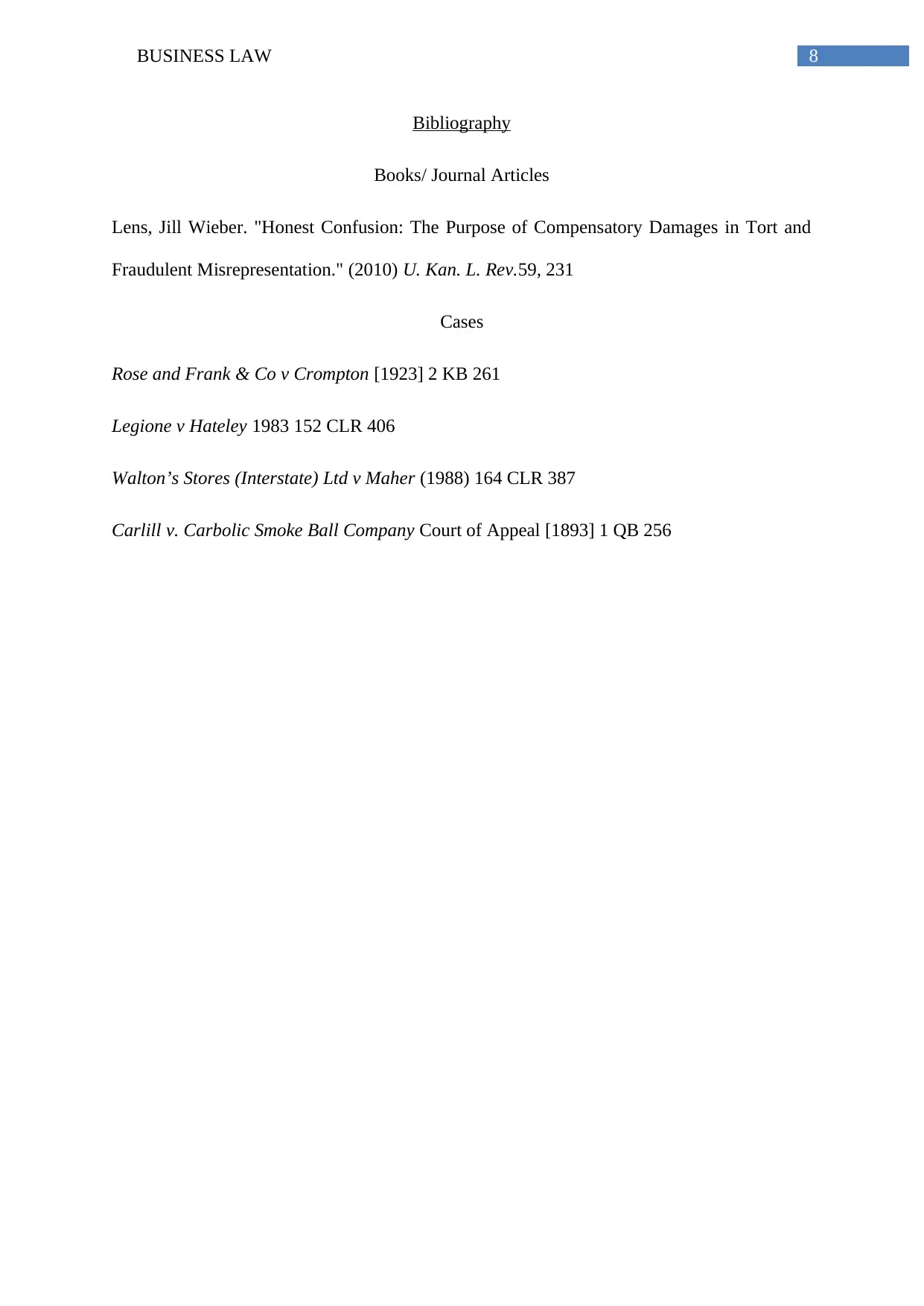
8BUSINESS LAW
Bibliography
Books/ Journal Articles
Lens, Jill Wieber. "Honest Confusion: The Purpose of Compensatory Damages in Tort and
Fraudulent Misrepresentation." (2010) U. Kan. L. Rev.59, 231
Cases
Rose and Frank & Co v Crompton [1923] 2 KB 261
Legione v Hateley 1983 152 CLR 406
Walton’s Stores (Interstate) Ltd v Maher (1988) 164 CLR 387
Carlill v. Carbolic Smoke Ball Company Court of Appeal [1893] 1 QB 256
Bibliography
Books/ Journal Articles
Lens, Jill Wieber. "Honest Confusion: The Purpose of Compensatory Damages in Tort and
Fraudulent Misrepresentation." (2010) U. Kan. L. Rev.59, 231
Cases
Rose and Frank & Co v Crompton [1923] 2 KB 261
Legione v Hateley 1983 152 CLR 406
Walton’s Stores (Interstate) Ltd v Maher (1988) 164 CLR 387
Carlill v. Carbolic Smoke Ball Company Court of Appeal [1893] 1 QB 256
⊘ This is a preview!⊘
Do you want full access?
Subscribe today to unlock all pages.

Trusted by 1+ million students worldwide
1 out of 9
Related Documents
Your All-in-One AI-Powered Toolkit for Academic Success.
+13062052269
info@desklib.com
Available 24*7 on WhatsApp / Email
![[object Object]](/_next/static/media/star-bottom.7253800d.svg)
Unlock your academic potential
Copyright © 2020–2026 A2Z Services. All Rights Reserved. Developed and managed by ZUCOL.





